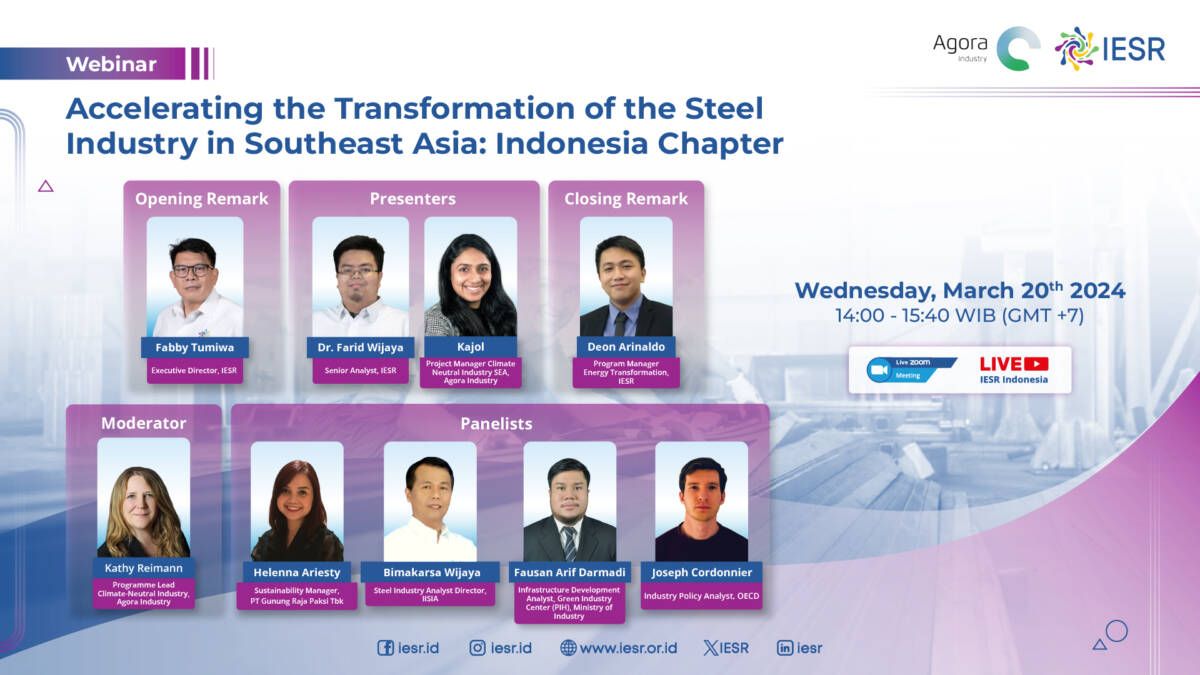
Webinar Accelerating the Transformation of the Steel Industry in Southeast Asia Indonesia Chapter
Replay Event
Background
Indonesia has committed to becoming a net-zero economy by 2060 including specific actions to be implemented for decarbonizing its industry sector, namely fuel switching, energy efficiency, electrification, hydrogen, biomass, and carbon capture and storage. Indonesia is Southeast Asia’s energy hub, and the industry sector has been playing an important role in the Indonesian economy. Since the past decades, this sector has been contributing around 39% – 44% of the country’s GDP formation. The important industry includes manufacturing, mining, and quarrying, which together have contributed to around 26.3% of Indonesia’s GDP in 2020 (BPS, 2021). Among these manufacturing industries, iron and steel are intensively energy-consuming and one of the major GHG emitters accounting for around 11.25 MtCO2e or 9.17% of the total industrial emissions. Several studies indicate the potential for overall energy intensity and GHG emission reduction through increased use of scrap, penetration of low-carbon technologies, and substitution of fossil fuels to low emission fuels. However, there are significant barriers that hinder the adoption of clean technologies in the steel sector, namely lack of awareness about technology, the right skills, access to finance, and supporting policies. To address these barriers, international cooperation is necessary. The transition to climate neutrality of the steel sector is in its early stages in most emerging economies, and pathways are generally not yet available. Given this situation, raising awareness often plays a much bigger role, as does capacity building to develop basic skill sets of actors connected to the industry.
With that background, Agora Industry along with IESR is launching a series of capacity-building workshops on Industrial Decarbonization for different actors in Indonesia. The objectives of these capacity-building workshops are:
- Developing a deeper knowledge of the steel industry’s status quo and understanding the transformational challenges. This would further help Indonesian steel industries and policymakers with a better understanding of technology and policy options.
- Creating a forum for the exchange of learnings and cross-country experience to accelerate and shift the investments away from blast furnaces. And enhance the knowledge base of each actor involved in Indonesia’s steel decarbonization.
Objective
The objective of this webinar is to discuss the opportunities for decarbonizing the Steel industries, industry expectations, and barriers in implementation.
- Understanding of cleaner fuel technologies, policies, and steel industry trends. Learn about the possible solutions and opportunities for decarbonization.
- Acknowledge and discuss the challenges and barriers associated with cleaner fuel adoption. Sharing and learnings from national and international case studies.
- Financial implications and availability of cleaner fuels, possible low-hanging energy transition options such as Energy efficiency improvement, and renewable energy adoption in the sector.
Presentation
Accelerating Decarbonization of Indonesia’s Iron and Steel Industry in Ensuring Sustainable Infrastructure Development – Farid Wijaya
Accelerating-Decarbonization-of-Indonesias-Iron-and-Steel-Industry-in-Ensuring-Sustainable-Infrastructure-Development-Farid-WijayaGlobal and ASEAN Steel Scenario – Kajol – Agora Industry
Global-and-ASEAN-Steel-Scenario-Kajol-Agora-IndustryGRP Presentation – IESR Webinar – Helena Ariesty
GRP-IESR-Webinar-20-March-2024-Helena-AriestySpeakers
-
Fabby Tumiwa - Chief Executive Officer (CEO) - IESR
-
Deon Arinaldo - Manajer Program System Energy Transformation IESR
-
Dr Farid Wijaya-Senior Analyst-IESR
-
Liliek Widodo - Director of Metal Industry - Ministry of Industry
-
Joseph Cordonnier - OECD
-
Bimakarsa Wijaya - Steel Industry Analyst Director - IISIA
-
Kathy Reimann - Agora Industry
-
Kajol K - Agora Industry
-
Helenna Ariesty - Expert from Gunung Raja Paksi

